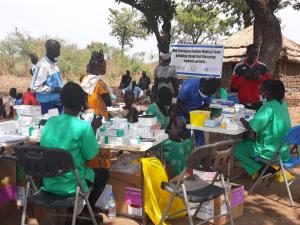WHO reached nearly 1 000 people with essential medical care in Sirimon village, Central Equatoria State
To increase access to the much-needed health care services and improve the health situation among the internally displaced people and host communities in the hard-to-reach villages of Sirimon and Kuda in South Sudan’s Central Equatoria State, the World Health Organization (WHO) has deployed an emergency mobile medical team to conduct integrated medical mobile services to save lives.
The team conducted medical consultations over the period of eight days and reached nearly 1 000 people with much-need medical care.
Sirimon village, located about 50 Kilometers North West of the Capital Juba, is one of the areas most affected by the conflict in Central Equatoria State and has witnessed a series of massive displacements since 2016.
“The huge population of the IDPs we are hosting now has resulted in overcrowding and this has resulted in malaria and pneumonia outbreaks and other conditions such as pregnancy-related complications, neonatal tetanus, typhoid among others,” said Mr Michael Sadad Lodu Lokite, the Paramount (Head) Chief of Dollo Payam. “We are very much thankful for the role WHO continue to play in supporting our government and people. The arrival of the mobile medical team has come as a relief to many residents”.
In South Sudan access to both basic and secondary healthcare services remain a major problem. The Ministry of Health in collaboration with WHO and partners is putting in place necessary measures both short and long term to address these issues.
The mobile medical team which comprised of clinicians, nurses and public health officers also prepositioned life-saving medicines and medical supplies including Interagency Emergency Health Kits (IEHK) basic module medicines, IEHK supplementary modules malaria, IEHK 2017 Basic malaria modules, Pneumonia kits and cholera community kit drugs modules to Sirimon and Kuda Primary Health Care Units (PHCUs) to treat additional 1,000 people living in the areas affected by the conflict for the next three months.
Dr Fabian Ndenzako, the WHO Representative a.i for South Sudan said, “the ongoing humanitarian crises in South Sudan has resulted in severe disruption of healthcare services delivery in the hard-to-reach locations and this has resulted to needless deaths from preventable disease and has left the people in those areas in despair".
“However, WHO will continue to work with partners to support the Ministry of Health to identify the underlying risk factors and address them”, Dr Ndenzako added.
In addition, the team assessed the functionality of the health facilities in the areas hosting the conflict-affected IDPs as well as Rokon PHCC, the only main health centre nearer to the IDPs to identify gaps and challenges hindering smooth service delivery to the IDPs as well as the host communities.
